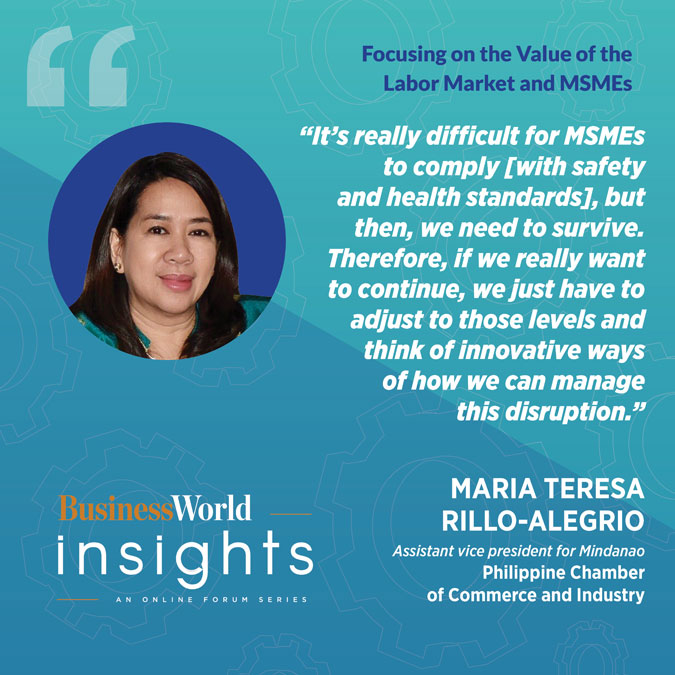BUSINESSWORLD INSIGHTS: Appreciating workers and MSMEs in the new normal
By Adrian Paul B. Conoza, Special Features Writer
The coronavirus disease 2019 (COVID-19) crisis has largely hit both businesses and their employees. The latest data from the Philippine Statistics Authority’s Labor Force Survey showed that there were 7.25 million Filipinos who were jobless last April compared to the same month last year. On the other hand, the Philippine government’s rapid assessment survey on micro, small, and medium enterprises (MSMEs) revealed that 77% of micro and small firms and 62% of medium ones are said to have closed down during the lockdown across Luzon.
As the economy reopens amid relaxed quarantine measures, MSMEs and their workforces are on a quest to bounce back from the drastic effects of the pandemic. While there are challenges left for them to tackle, there are opportunities for them to take advantage to the new normal and eventually thrive from the crisis.
The third leg of the second phase of BUSINESSWORLD INSIGHTS has looked further into these matters through the perspectives of Francis del Val, president and chief executive officer (CEO) of Cobena Business Analytics and Strategy, Inc.; Ghaye Alegrio, assistant vice-president for Mindanao at Philippine Chamber of Commerce and Industry (PCCI); and EJ Arboleda, CEO of tax filing platform Taxumo. The online forum, held last June 10, was moderated by Leo Uy, head of BusinessWorld’s research department.
Going digital in a reimagined future

Mr. del Val of Cobena emphasized the need for businesses to make a shift to digital, moving on from past means of doing business and adopting a mindset that reimagines the future.
“The future is going to be very different, but it’s a future that is going to be successful if we are mindful of the fact that we need to turn to digital to adapt and accelerate into what is going to be a reimagined future,” he said.
In reimagining the future, digital transformation serves as the key for businesses to survive and thrive, according to Mr. del Val. Out of monitoring social intelligence, the firm has observed the prevalence in digital as seen in the rise of e-commerce as well as an uptrend in using applications such as Viber and Instagram as mediums for commerce.
Reimagining the future also involves taking advantage of the fact that the country has a huge base of millennials and Generation Z, according to Mr. del Val.
“Digital natives who are there, who have the purchasing power, we just need to be able to work with them in terms of what they are familiar with; and those terms are really digital,” he said.
With digital removing physical barriers, he continued, plus the advent of telecommuting, offices may not be necessary. In this area, Mr. Del Val advises MSMEs to consider cutting rents and putting that money back to their working capital.
Travel agencies, he illustrated, can scale down their offices to a particular room, while providing laptops to other employees so that they could still perform their tasks even remotely.
While digital transformation has its perks, Mr. del Val shared that there are certain things that really get in the way including generational and geographic concerns.
In terms of generational concerns, businesses might have to reconcile digital natives such as millennials and Generation Z with digital migrants such as the Generation X. Geographic concerns about digital transformation, on the other hand, depend on whether businesses are located in the urban centers, where digital is much embraced, or farther from urban centers, where digital seems to be not critical and not even very accessible.
Nevertheless, in spite of these hurdles, a business’ mindset matters more. “We have to either say the hurdles are going to be there, or we’re going to say ‘Let’s do something about it’,” he said.
Moreover, going digital does not come without risk, Mr. del Val added, especially that such a transition heavily involves data that is collected and analyzed. Issues include compliance with the country’s Privacy Act, the security of their network, and the capability of their people in supporting their network.
These issues, nonetheless, don’t have to be solved by businesses themselves, as there are many organizations and experts who can help them out in these areas. Moreover, investments to digital can be done even at a minimal price.
“You don’t have to put up large amounts of capital at the beginning,” he said. “You just pay your investment so as you succeed as a business, then the amount of money that goes into it is proportionally increasing.”
Aside from reimagining the future and tapping digital transformation, Mr. del Val also advises MSMEs to go through a thought process where they seriously examine why did they start their businesses in the first place.
“You need to ask yourself: What spurred you to create that business? Is that still relevant today? And if it is, the next question has to be: Are you still very passionate about it? Because, if it’s relevant and you’re passionate about it, you need to think: What is the different model by which I can deliver the same product or service?” he advised.
Government’s actions

Ms. Alegrio of PCCI, meanwhile, looked into the policies being set in place to assist MSMEs during the crisis. She started by commending the government’s response to the chamber’s consolidated petition for relief from the constraints and uncertainties imposed on the livelihood, mobility, safety, and health of MSMEs and their employees.
Among its many recommendations include deferment of tax payments, the enjoinment of telcos to remove data capping in mobile broadband internet services, and the establishment of a rehabilitation fund for affected MSMEs in the areas of technical assistance and special financing for working capital.
“PCCI is very pleased that our national government has immediately responded to our call by instituting measures, programs, tax relief, and incentives laid out by the Bayanihan Act,” she said. “And moving forward on the road to recovery, the government’s economic managers have put together a comprehensive set of fiscal and non-fiscal measures just to ensure the continued operations of the MSMEs nationwide.”
Furthermore, the PCCI official noted that the most impacted businesses are in the service sector, which composes 60% of the economy. In particular, the wholesale and retail sector and non-essential businesses were badly hit.
In trying to save the predicament of its workers, she continued, most MSMEs resorted to advancing salaries, 13th-month pay, and social amelioration benefits to their employees when the lockdown took place. With the quarantine extended, however, a serious cash-flow problem emerged, causing further searches for calamity loans.
“Now, with the easing of restrictions and with the government’s assurances that there will be some bridge loans available, the real challenge now is the accessibility and timeliness of this assistance,” she noted, adding that the chamber is working closely with government institutions such as the Small Business Corporation to facilitate such things.
Ms. Alegrio added that there should be a structural adjustment on the part of the MSMEs in order for them to cope with the new normal. One way they could do this is by creating a business continuity plan, which the PCCI official observed MSMEs lacked.
That continuity plan, she continued, should cover a risk assessment of a business’ supply chain, including the workforce critical for continued operation. Logistics and financial resources needed to support short- to medium-term disruption should also be included, as well as compliance with health and safety standards that will protect employees and customers.
“It’s really difficult for MSMEs to comply, but then we need to survive. Therefore, if we really want to continue, we just have to adjust to those levels and think of innovative ways of how we can manage this disruption,” she said.
The PCCI official also said that the current situation necessitates private and government collaboration.
“[W]e really need to have active participation, especially as our government is also trying its best to cushion the impact by coming up with certain guidelines,” she said. “But sometimes, these guidelines may really not be suited to our needs, and therefore it takes a very active private sector to be able to tell them that maybe we need to adjust [those guidelines].”
Ensuring vibrancy among startups

Out of the data his company gathered from its users, Taxumo’s Mr. Arboleda finds that many people are getting their minds open to digital and to new solutions.
“In our case in Taxumo, we had an increase of 150% over the normal volume of monthly sign-ups that we got before ECQ (enhanced community quarantine), he said. “ECQ was really a big driver for people to try out new services online.”
“I think what ECQ did that really helped MSMEs was that it forced customers, who normally would not have responded to digital services, to try them out,” he added.
From observing the uptrend in telemedicine nowadays, Mr. Arboleda noted that what was initially employed for overseas Filipino workers (OFWs) before the quarantine has finally been employed in the present context.
“The context before made sense for the OFWs, because they weren’t in the Philippines and [so] didn’t have access to someone they normally trust…That same context now applies to the normal Filipinos at home,” he said.
From this application, he challenges MSMEs to figure out services or strategies that were used before to reach out to people remotely and whether those strategies can also be applied to their businesses.
Understanding markets are also important to consider, Mr. Arboleda added, especially in light of digital transformation and the current crisis.
“I would advise that you look at that particular market and see how you can service that market right now and what are the unique needs of that market. How can you make sure that what you’re offering is something that appeals specifically to them?” he said.
Furthermore, Mr. Arboleda finds it timely for businesses to find out which markets they are presently reaching, as well as to try out other means of providing service to their current markets.
“I think it’s important for you to also use this time to understand the basic assumptions of your business. Do those still hold? The market you’re going after, are they still your market? How you’re going after them, is that still the way to go after? How you deliver the service, is that still the way to deliver the service?” he said.
Mr. Arboleda warned against going digital because people are saying to do so. He advised businesses to understand first the parts of their businesses, and which of them would probably be better with automated processes. For him, this is a means to mitigate risks in going digital.
“Go into digital because it makes sense in the context of your business,” he said. There are certain parts of your business wherein automating will be easier for you, then adopt that.”
Furthermore, regarding startups, the Taxumo CEO highlights the importance of ensuring that the startup industry is very much taken care of, especially as startups encounter challenges in financing.
“It is very difficult for a lot of small businesses and startups to get financing at this point. I think that’s something that I encourage the government to look because it’s very important to make sure that [startups are] still a vibrant part of the economy.”
After all, Mr. Arboleda finds that startups are driven by making a difference one solution at a time. “I hope that the ECQ made us realize that at the end of the day money is one thing,” he said, “but what we want to do is to make a change and leave this world better than we came in.”



